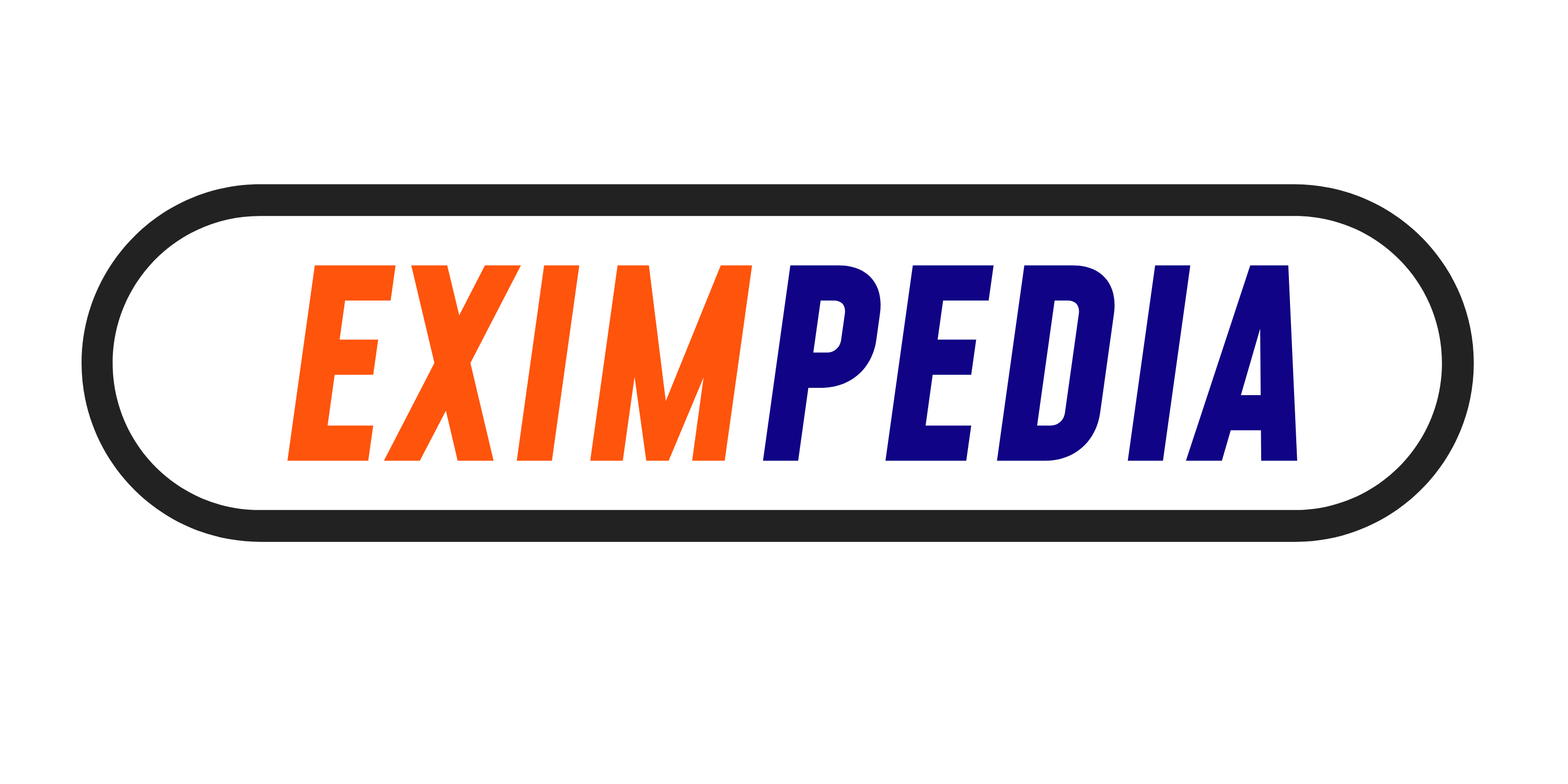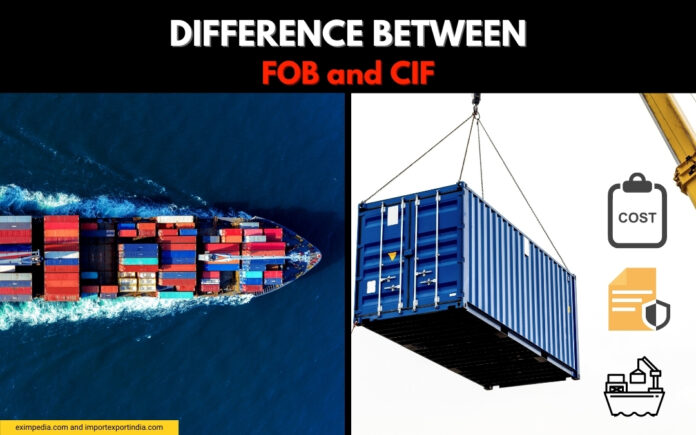When you start importing or exporting or when you are involved in the process of foreign trade logistics, it is highly important to know all the foreign trade terminologies along with their rules. By understanding the exact difference between FOB and CIF Incoterms will help you to take your trade terms-related complicated decisions with ease.
Even though both of them CIF (Cost, Insurance, and Freight) and FOB (Free on Board) are international shipping agreements used while the transportation of goods between buyer and seller, Both have very different meanings. FOB and CIF are among the 11 most common INCOTERMS established by the international chambers of commerce which are accepted and used worldwide.
Different businesses around the world have different risks involved in them. In this topic, we are going to talk about the Incoterms terminology and definition of CIF and FOB.
Table of Contents
What is CIF?
CIF also known as Cost, Insurance and Freight is a mutually agreed international term. Which represents the charges that a seller pays to cover the cost, insurance, and freight while the cargo is in transit. One thing which you have to note here is that Cost, insurance, and freight (CIF) only applies when the goods are being transferred via a waterway, Sea, or Ocean.
In the CIF agreement, the seller has to bear the cost of any loss or damage to the product, till the goods are delivered to the destination port of the buyer. Other than that seller is also liable for any additional requirements such as custom duties export paperwork for rerouting.
Once the goods have been successfully received at the port of destination of the buyer. The seller won’t be liable for any fee for unloading and delivering the goods to the final destination.
Sellers responsibilities in CIF:
- Export license for product
- Shipping fees
- Packaging of cargo
- Fee of exporting Custom and taxes
- Insurance fee until shipment reach buyer port
- Cost of any damage to good
Buyer Responsibilities in CIF:
- Custom duty at destination port
- Charges for transportation to final destination
- Unloading the product at the terminal
What is FOB?
FOB is known as Free on Board which is a term used while transferring the goods from the seller’s site to the destination of the buyer. Just like CIF it is also valid and used while the goods are being transferred via the Waterway, Sea, or Ocean. In the FOB agreement, the seller will bear the risks and costs till the goods are loaded on the ship. Once the goods are loaded on the ship and are ready for export the buyer will bear further associated costs like international freight, unloading, and customs clearance at the destination port, transport costs till goods reach the destination.
In the FOB agreement, the Buyer is responsible for the damage, loss, or rerouting costs once the goods are on the ship. And if any extra charge comes along with it like custom duty or loading, unloading at destination port the buyer of the goods will be responsible for it.
Insurance in the case of FOB terms is negotiable and depends on the agreement between the buyer and the seller.
Seller Responsibilities in FOB:
- Shipping fees
- Packaging of cargo
- Fee of exporting Custom and taxes
- Costs and risks till the goods are loaded on the ship.
Buyer Responsibilities in FOB:
- International Freight till the destination port.
- Unloading the goods at destination port.
- Custom duty at destination port.
- Charges for transportation to final destination
FOB vs CIF: What is the difference between FOB and CIF?
Till now we have learned about Cost, Insurance and Freight (CIF) and Free on Board (FOB) separately. But for a fresh businessman, it is very important for him to learn the key differences between both of them. Both of them are only used for sea/waterways only.
There are 3 things to consider:
- COSTS – who will bear what costs and till where?
- RISK – at what point does the seller risk end and buyer risk start
- INSURANCE – Who will be responsible to take insurance for goods?
Let us know what is the difference between FOB and CIF by distinguishing their key factors through this table below –
| FOB (FREE ON BOARD) | CIF (COST, INSURANCE & FREIGHT) |
| COSTS – • Seller: will bear all costs until the goods are loaded on the ship. • Buyer: will bear costs once the goods are loaded on the ship. It will include international freight (cost of shipping goods to destination port) also. | COSTS – • Seller: will bear costs till the goods reach the destination port. The cost for Unloading the goods at the port will be as per the agreement. • Buyer: will bear all costs after the goods have reached the destination port. |
| RISK – • Seller: Will bear the risk till the goods are actually loaded on the ship. • Buyer: will bear risk after the goods are loaded and kept on the ship. | RISK – • Seller: will bear risk till the goods are loaded on the ship (same as FOB). • Buyer: will bear risk after the goods are loaded and kept on the ship. |
| Insurance – In FOB, the insurance is negotiable and will completely depend on the agreement between buyer and seller. Insurance is not compulsory. | Insurance – In CIF, insurance is compulsory and should be arranged by the seller. Minimum insurance cover in CIF is invoice value + 10% (i.e. 110%). If more coverage is needed for the goods then such should be mentioned in the agreement. |
FOB v/s CIF – Which method is better?
Both FOB & CIF are widely and most commonly used incoterms. After knowing the difference between FOB & CIF, you now know that the risks involved in both are the same. The only discussion point that remains is Costs and Insurance.
If the seller is ready to pay for international freight then CIF is to be selected and if not then FOB is to be selected.
If the seller says he is ready to pay international freight and selects CIF incoterm then it is obvious the seller will have to arrange for insurance also. In FOB, whether to take insurance or not and who will take it will completely depend on the agreement terms.
Both methods have their own advantages and disadvantages in terms of costs, insurance, and freight. Your selection should be completely based on your ability to arrange for the required costs and agreement terms.
We hope that your queries related to the difference between FOB and CIF are cleared after reading this article. You can comment down below if you have any questions related to this topic.
Also, you must read eximpedia‘s article on INCOTERMS 2020 Rules – Latest 2021 Guide – https://eximpedia.com/incoterms2020-latest-2021-guide/ This article explains in the easiest possible way for you to understand the complete details about Incoterms rules. Do check out the infographics of this article and save or bookmark them for referring to all the 11 INCOTERM Rules.







